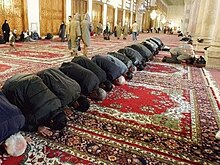Prayer


Prayer is a worship and communication to God. Prayer can be spoken, silent (no talking), or in a song. It can be used to praise God or to ask for something including help and forgiveness.
Prayer can take a variety of forms: it can be part of a set ritual or an individual invocation and can take the form of a hymn, a ritual statement, or a spontaneous expression. It can be done alone or in groups.
In Christianity, prayers are varied. They can be completely spontaneous, or read entirely from a text, like the Anglican Book of Common Prayer. The most common prayer among Christians is the Lord's Prayer, which according to the gospel accounts is how Jesus taught his disciples to pray.
In Islam, salat is observed three[1][2] or (most commonly) five times every day at prescribed times.
Hinduism has prayer to various divinities or holy beings.
Dua[change | change source]

duʿāʾ (Arabic: اَلدُّعَاءُ) is a prayer or request made by Muslims[3][4] in which they ask for help from their God. Muslims see dua as a very serious way of worship.
Dua has been done by Muslims for a long time,[5] as it is seen as very important by a lot of Muslims and Muslim families.[6] They have been carried on as traditions.
References[change | change source]
- ↑ Na, Abdullahi Ahmed An-Na'im; Naʻīm, ʻabd Allāh Aḥmad (30 June 2009). Islam and the Secular State. ISBN 9780674033764.
- ↑ Edward E. Curtis IV (2009-10-01). Muslims in America: A Short History. Oxford University Press. ISBN 978-0-19-974567-8.
- ↑ John L. Esposito, ed. (2014). "Dua". The Oxford Dictionary of Islam. Oxford: Oxford University Press. Archived from the original on 2018-04-23. Retrieved 2021-06-14.
- ↑ Gardet, L. (2012). "Duʿāʾ". In P. Bearman; Th. Bianquis; C.E. Bosworth; E. van Donzel; W.P. Heinrichs (eds.). Encyclopaedia of Islam (2nd ed.). Brill. doi:10.1163/1573-3912_islam_COM_0195.
- ↑ Asani, A. S. (1987). "The khojahs of Indo-Pakistan: The quest for an Islamic identity". Journal of Muslim Minority Affairs. 8: 31–41. doi:10.1080/02666958708716015.
- ↑ "The Importance of Dua in Islam". AZIslam. 30 November 2017. Archived from the original on 14 June 2021. Retrieved 14 June 2021.
